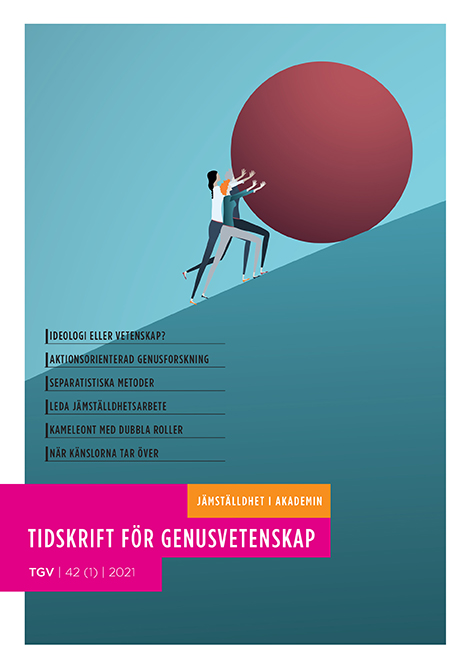Aktionsorienterad genusforskning för en genusmedveten akademi
DOI:
https://doi.org/10.55870/tgv.v42i1.1987Nyckelord:
Genusmedvetet ledarskap, aktionsorienterad genusforskning, genusvetenskap, pedagogisk teoribildning, chefer, genusmedveten akademiAbstract
The article presents how the approach action-oriented gender research can be used in change processes to achieve a genderaware academy. The approach has previously been developed in several research and development projects, in the public and private sectors, while the article shows that the approach can also be applied within the academy. Action-oriented gender research is rooted in gender research that studies how gender is done in organizations, and in action-oriented pedagogical theory that engages with learning in and development of organizations. The approach also has a well-proven methodology for how processes of change can be conducted. The methodology is characterized by working with a group as a method and especially a group of managers; both women and men. The approach is further characterized by two models that are anchored in gender and action research. The approach’s model of change consists of three processes: learning and exploration, mobilization and change (Amundsdotter 2009). Participating managers initially work to create knowledge about how gender is done in the organization. Thereafter, mobilization for change begins through the development of strategies and a deepened understanding of gender, power and organization. The strategies are gradually formed into change work at one’s own workplace. The gender-theoretically grounded model included in the approach has taken inspiration from Joan Acker (1992) and consists of four processes: gender divisions, symbols and images, interactions and internal mental work. This latter model has been applied in the learning and change processes that are organized so that both quantitative and qualitative aspects are focused. The purpose of the article is to present the theoretical and methodological foundations of the approach and to show how the approach has been applied within academia. In addition, the results that emerged during change work at two Swedish universities with the ambition of achieving a gender-aware academy are described.
Nedladdningar
Downloads
Publicerad
Referera så här
Nummer
Sektion
Licens
Författaren/författarna behåller copyright till verket.





